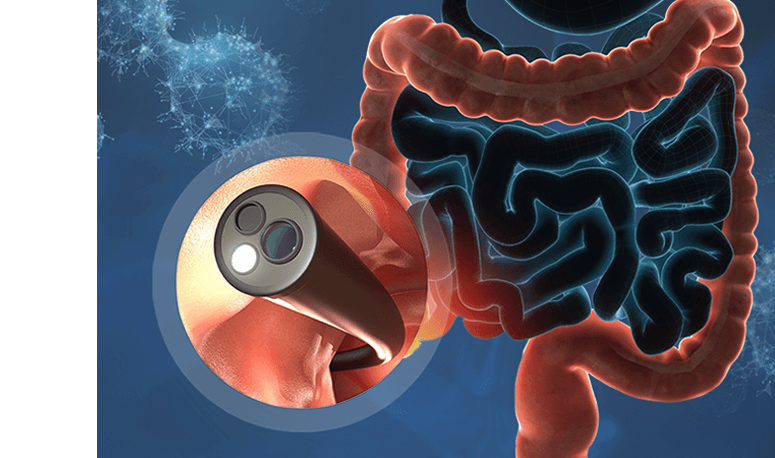Do You Belong to Any of the Following High-Risk Groups?
- Aged 50 and above
- In the Singapore context, of Chinese ethnicity
- Has a personal history of colorectal polyps or cancer
- Has a family history of colorectal polyps or cancer
- Has ulcerative colitis or Crohn’s disease
- Leads a sedentary lifestyle and is obese
- Drinks and smokes, indulges in processed and red meats

Effective Prevention Through Timely Colonoscopies
What is a Colonoscopy?
While there are several ways to test for colorectal cancer, the gold standard for testing is the colonoscopy, as it is the most accurate and efficient method. A colonoscope is a long, thin and flexible tube that is connected to a small light and camera at the tip. From the anus, it is gently threaded through the colon with the patient comfortably sedated.
As the colonoscope travels through, it transmits clear real-time images onto a screen, from which your colorectal doctor will be able to identify the presence of any polyps – which will be removed on the spot before it ever gets a chance to potentially develop into cancer.
Get Screened Based On Your Risk Profile
For those with only older age as a risk factor, you should undergo a colonoscopy once you are past the age of 50. If you receive a negative result, you only need to undergo your next colonoscopy 10 years later, as colorectal cancer is typically a slow-progressing disease.
For those with any of the other risk factors mentioned above, such as family or personal history of colorectal polyps/cancer, you may be recommended to get a colonoscopy earlier than 50 years old and at a shorter interval than 10 years apart.
“No Symptoms” Doesn’t Mean “Safe”!
Colorectal cancer may be a slow-progressing disease, but it is also a sneaky one – it typically presents with no obvious symptoms in its early stages.This is why many people are diagnosed still without any symptoms (detected incidentally through a routine screening).
What If I Already Notice Some Symptoms?
The later stages of colorectal cancer are often associated with: a change in bowel patterns (e.g. constipation or diarrhoea), changes in stool colour and consistency, blood in the stool, rectal bleeding, abdominal pain, chronic fatigue and unexplained weight loss.
Seek medical attention from a colorectal surgeon immediately; but also bear in mind that some of these symptoms can mimic those of other colorectal issues, such as piles or irritable bowel syndrome. The key is to get an accurate diagnosis as soon as possible so that colorectal treatment can commence.
Our Colorectal Surgeons

Dr Dennis Koh
Medical Director & Senior Consultant Surgeon
B Med Sci (Nottingham), MBBS (Nottingham)
MMed (Surgery), FRCS (Edinburgh), FAMS
Dr Dennis Koh is a MOH-accredited and experienced colorectal surgeon with specialised expertise in the management and treatment of colorectal cancer; and currently the Medical Director at Colorectal Practice.
Dr Koh strives to provide a customized treatment plan for each patient, which allows for better outcomes. He also honed his skills in proctology abRd in Geneva, bringing a more diverse touch to his practice.

Dr Sharon Koh Zhiling
Senior Consultant Surgeon
MBBS (Singapore), MMed (Surgery),
FRCS (Edinburgh), FAMS
Dr Sharon Koh is an experienced colorectal surgeon and the former Director of Endoscopy at Alexandra Health. She has subspecialty training in colorectal surgery, minimally invasive surgery, and advanced endoscopy — particularly in the field of colorectal cancer.
Dr Koh completed her fellowship at Cedars-Sinai Medical Centre in the US after being awarded the Academic Medicine Development Award by the National University Hospital.

Dr Pauleon Tan Enjiu
Senior Consultant Surgeon
MBBS (Singapore), MMed (Surgery),
FRCS (Edinburgh), FACS
Dr Pauleon Tan has served in public hospitals for over 15 years and is experienced in minimally invasive surgery and endoscopy. He is also experienced in the treatment for colorectal cancer, and strives to provide the best possible care to his patients.
Dr Tan undertook advanced colorectal surgical training at Japan’s Saitama International Medical Center after being awarded the Ministry of Health – Health Manpower Development Plan (HMDP) Award.


